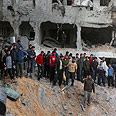
Gaza: Hamas hunting Fatah loyalists who 'collaborated with Israel'
Human rights researchers say Islamist group killed at least six Fatah men it claims assisted in killing of senior Hamas figures during recent war. 'Hamas turned on their own people,' relative of Fatah loyalist in hiding says
While the IDF's offensive in Gaza ended a few weeks ago, Palestinian infighting in the coastal enclave is raging on, as Hamas security forces are seeking out Fatah loyalists who the Islamist group accuses of collaborating with Israel during Operation Cast Lead.
Human rights researchers told Ynet that at least six Fatah loyalists have been killed and several others have been detained since the ceasefire between Israel and Hamas took effect as part of the Islamist group's efforts to cement its rule over Gaza. Many other Fatah men have gone into hiding, they said.
Hamas said anyone who may have been killed in such cases must have been a collaborator with Israel.
"Maybe there were one or two cases, but people have to check and, when they check, maybe they will figure out that those people are collaborating with the Israelis," said Hamas political strategist Ahmed Yousef, who now serves as deputy foreign minister for the Hamas government in Gaza.
"I do believe that, when it comes to taking action against anybody, there is some proof that the guy is guilty of something. This is a time of war, so you have to be careful."
Known collaborators, Yousef said, were told to stay in their homes during the war, "just to protect them from being killed."
During the military operation, Israel was able to kill three influential Hamas leaders, something that almost-certainly would not have been possible without the active help of Gaza informants.
Israel is now said to be looking to see if the military carelessly lost critical informants by blowing their covers.
Intimidation tactics
In the case of Said Siam, Gaza is awash in rumors that the Hamas interior minister was betrayed by a bodyguard who dialed an Israeli cell number before the air strike.
The fear of Hamas extends to the street, where, time-after-time, people seemed cautious speaking their minds whenever strangers popped into a circle to listen to an interview with a journalist.
Some Fatah families seemed reluctant to reveal any information about where and how Hamas militants fought Israel.
Israel might have hoped that the military offensive would turn people against Hamas in Gaza, but Palestinians are still afraid to even speak out publicly against the Gaza rulers, much less rise up and topple the government.
Abu Diana (pseudonym), who is among the dozens of Fatah members who say they have been shot, beaten, threatened, and/or detained by Hamas in recent weeks, is stretched out on a relative's couch with a cast on one leg and bandages on the other.
The 37-year-old was one of the Palestinian Authority security officers swiftly routed by Hamas fighters in June, 2007 when the Islamist group seized military control of Gaza.
Like other Fatah loyalists in Gaza, Abu Diana got a salary from the PA government in Ramallah and kept low as Hamas kept a firm grip on power in Gaza.
Abu Diana said he was at his Gaza City home on Jan. 2nd when five plain-clothed Hamas security members came to his door and tried to arrest him for allegedly holding a Fatah meeting at his home.
Women from the neighborhood saw what was going on and created such a commotion that the Hamas security members left without taking Abu Diana. But, two hours later, while driving back from the store, Abu Diana said masked men opened fire on him near his house.
His wife rushed him to Shifa Hospital, where a sympathetic doctor told him to get out of there before Hamas militants checking the wounded finished the job.
Abu Diana made a run for a private hospital in Khan Younis and has been in hiding ever since.
"The most painful thing is that Hamas attacked its own people," said Abu Diana's mother-in-law. "I like that Hamas fights Israel. I like that they are clean. But not that they turn on their own people."
Now, Hamas is turning on the United Nations.
The United Nations refugee agency, which provides aid to about three-quarters of the 1.5 million Palestinians in Gaza, has suspended aid imports because Hamas has confiscated food and blankets from the UN.
John Ging, head of the UN refugee agency, said the confiscations "crossed a red line."
"We're not going to bring aid in here and let it be hijacked by Hamas or anyone else," said Ging.










